Healthcare and Leadership Discussion Assignment: Nutrition & Lifestyle
VerifiedAdded on 2023/03/30
|7
|1108
|173
Discussion Board Post
AI Summary
This discussion assignment explores two key areas: the impact of nutrition, physical activity, and lifestyle on healthcare complications in middle-aged individuals, and the differences between leaders and managers in healthcare settings. The first discussion analyzes how advancements in healthcare, global stressors, and lifestyle changes, including dietary habits and decreased physical activity, have led to increased prevalence of conditions like cancer, diabetes, and obesity. It references research by Petrella et al. (2014), Awosan et al. (2014), and Smetanina et al. (2015) to support the importance of active lifestyles and healthy eating habits. The second discussion differentiates between leaders and managers, examining their roles, work styles, and risk-taking behaviors. It highlights the advantages and disadvantages of both leadership styles, drawing on insights from Goleman (2018), Svara (2016), and Zhang et al. (2014). The assignment provides a comprehensive analysis of these critical aspects of healthcare and management.
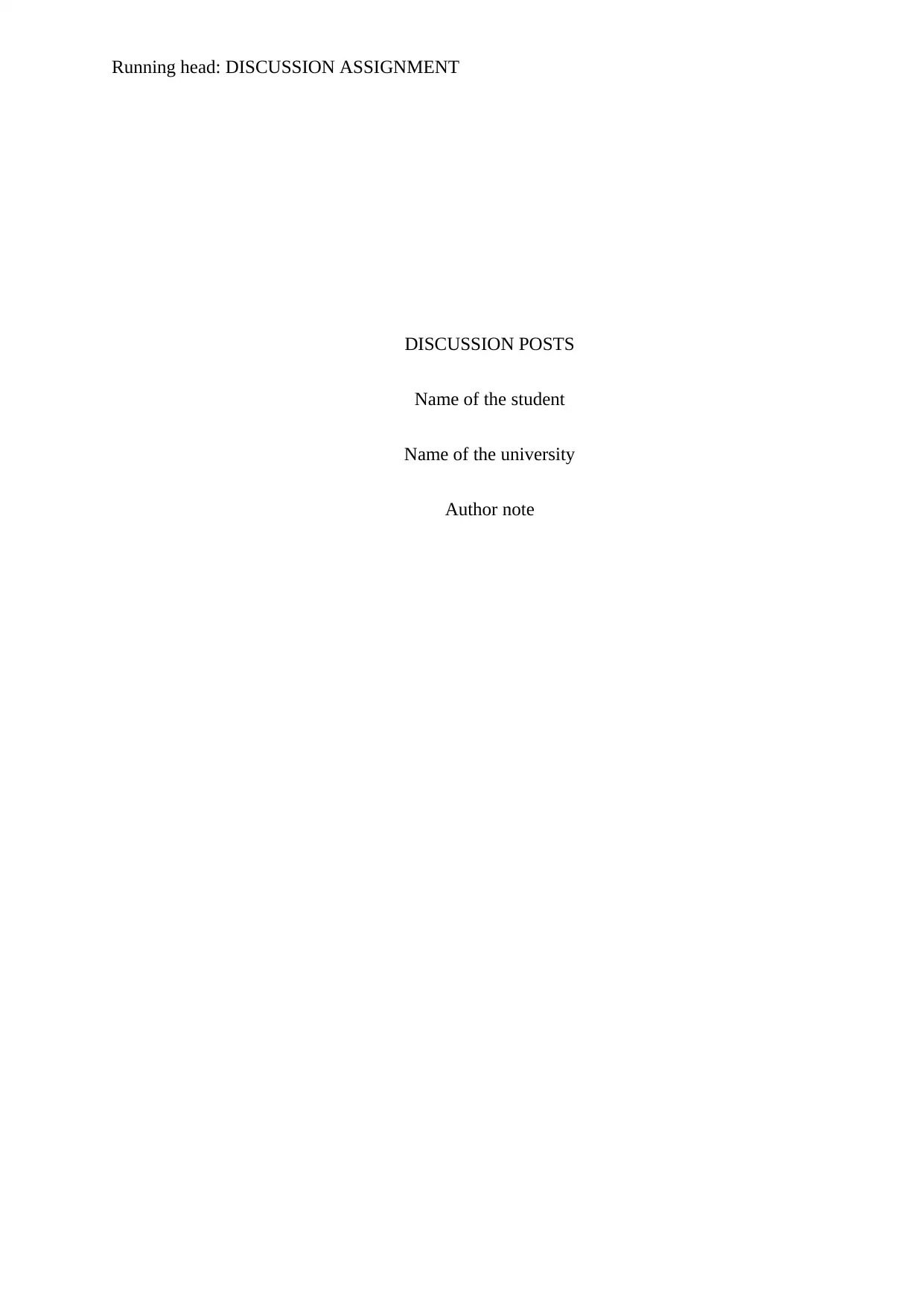
Running head: DISCUSSION ASSIGNMENT
DISCUSSION POSTS
Name of the student
Name of the university
Author note
DISCUSSION POSTS
Name of the student
Name of the university
Author note
Paraphrase This Document
Need a fresh take? Get an instant paraphrase of this document with our AI Paraphraser
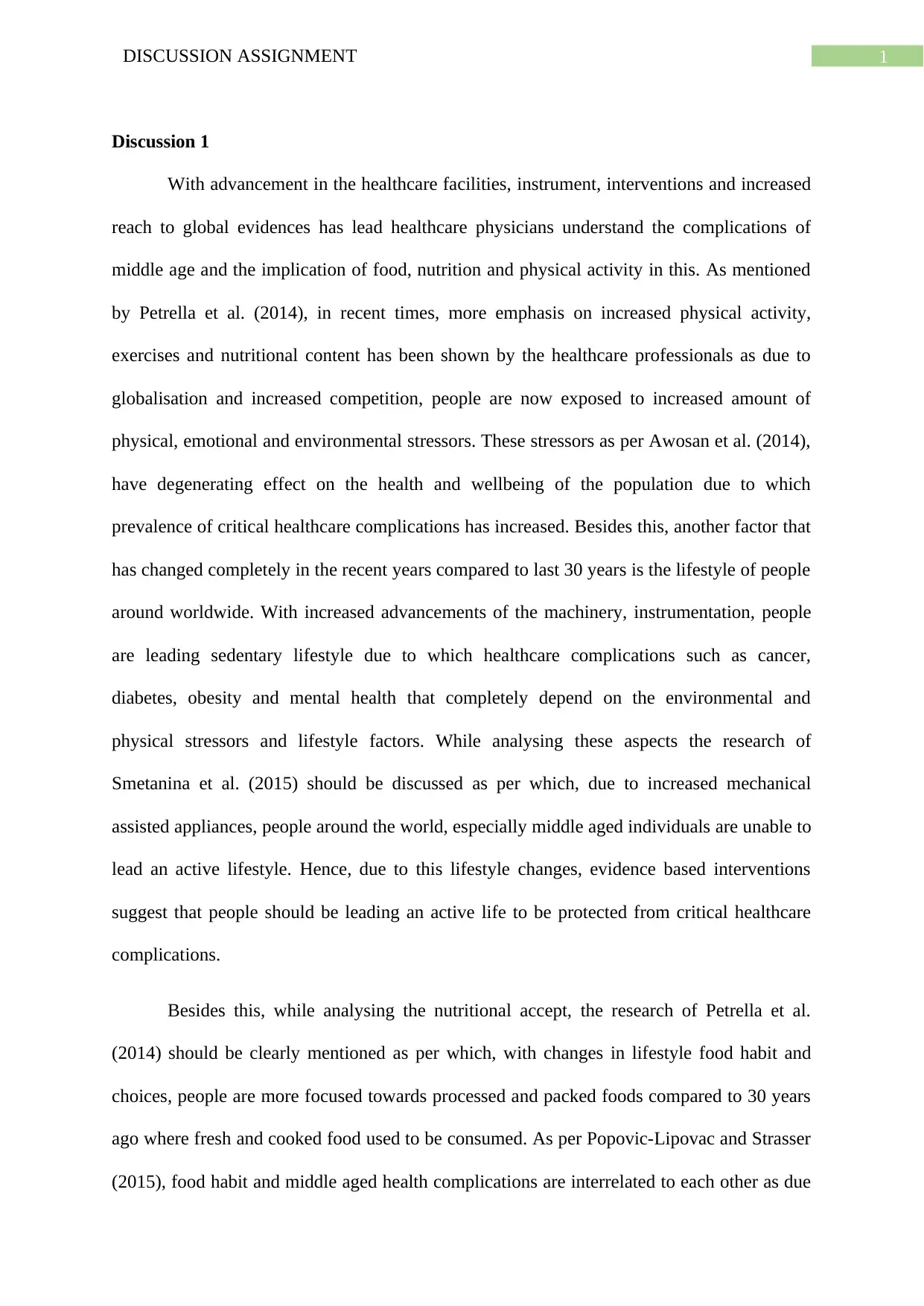
1DISCUSSION ASSIGNMENT
Discussion 1
With advancement in the healthcare facilities, instrument, interventions and increased
reach to global evidences has lead healthcare physicians understand the complications of
middle age and the implication of food, nutrition and physical activity in this. As mentioned
by Petrella et al. (2014), in recent times, more emphasis on increased physical activity,
exercises and nutritional content has been shown by the healthcare professionals as due to
globalisation and increased competition, people are now exposed to increased amount of
physical, emotional and environmental stressors. These stressors as per Awosan et al. (2014),
have degenerating effect on the health and wellbeing of the population due to which
prevalence of critical healthcare complications has increased. Besides this, another factor that
has changed completely in the recent years compared to last 30 years is the lifestyle of people
around worldwide. With increased advancements of the machinery, instrumentation, people
are leading sedentary lifestyle due to which healthcare complications such as cancer,
diabetes, obesity and mental health that completely depend on the environmental and
physical stressors and lifestyle factors. While analysing these aspects the research of
Smetanina et al. (2015) should be discussed as per which, due to increased mechanical
assisted appliances, people around the world, especially middle aged individuals are unable to
lead an active lifestyle. Hence, due to this lifestyle changes, evidence based interventions
suggest that people should be leading an active life to be protected from critical healthcare
complications.
Besides this, while analysing the nutritional accept, the research of Petrella et al.
(2014) should be clearly mentioned as per which, with changes in lifestyle food habit and
choices, people are more focused towards processed and packed foods compared to 30 years
ago where fresh and cooked food used to be consumed. As per Popovic-Lipovac and Strasser
(2015), food habit and middle aged health complications are interrelated to each other as due
Discussion 1
With advancement in the healthcare facilities, instrument, interventions and increased
reach to global evidences has lead healthcare physicians understand the complications of
middle age and the implication of food, nutrition and physical activity in this. As mentioned
by Petrella et al. (2014), in recent times, more emphasis on increased physical activity,
exercises and nutritional content has been shown by the healthcare professionals as due to
globalisation and increased competition, people are now exposed to increased amount of
physical, emotional and environmental stressors. These stressors as per Awosan et al. (2014),
have degenerating effect on the health and wellbeing of the population due to which
prevalence of critical healthcare complications has increased. Besides this, another factor that
has changed completely in the recent years compared to last 30 years is the lifestyle of people
around worldwide. With increased advancements of the machinery, instrumentation, people
are leading sedentary lifestyle due to which healthcare complications such as cancer,
diabetes, obesity and mental health that completely depend on the environmental and
physical stressors and lifestyle factors. While analysing these aspects the research of
Smetanina et al. (2015) should be discussed as per which, due to increased mechanical
assisted appliances, people around the world, especially middle aged individuals are unable to
lead an active lifestyle. Hence, due to this lifestyle changes, evidence based interventions
suggest that people should be leading an active life to be protected from critical healthcare
complications.
Besides this, while analysing the nutritional accept, the research of Petrella et al.
(2014) should be clearly mentioned as per which, with changes in lifestyle food habit and
choices, people are more focused towards processed and packed foods compared to 30 years
ago where fresh and cooked food used to be consumed. As per Popovic-Lipovac and Strasser
(2015), food habit and middle aged health complications are interrelated to each other as due
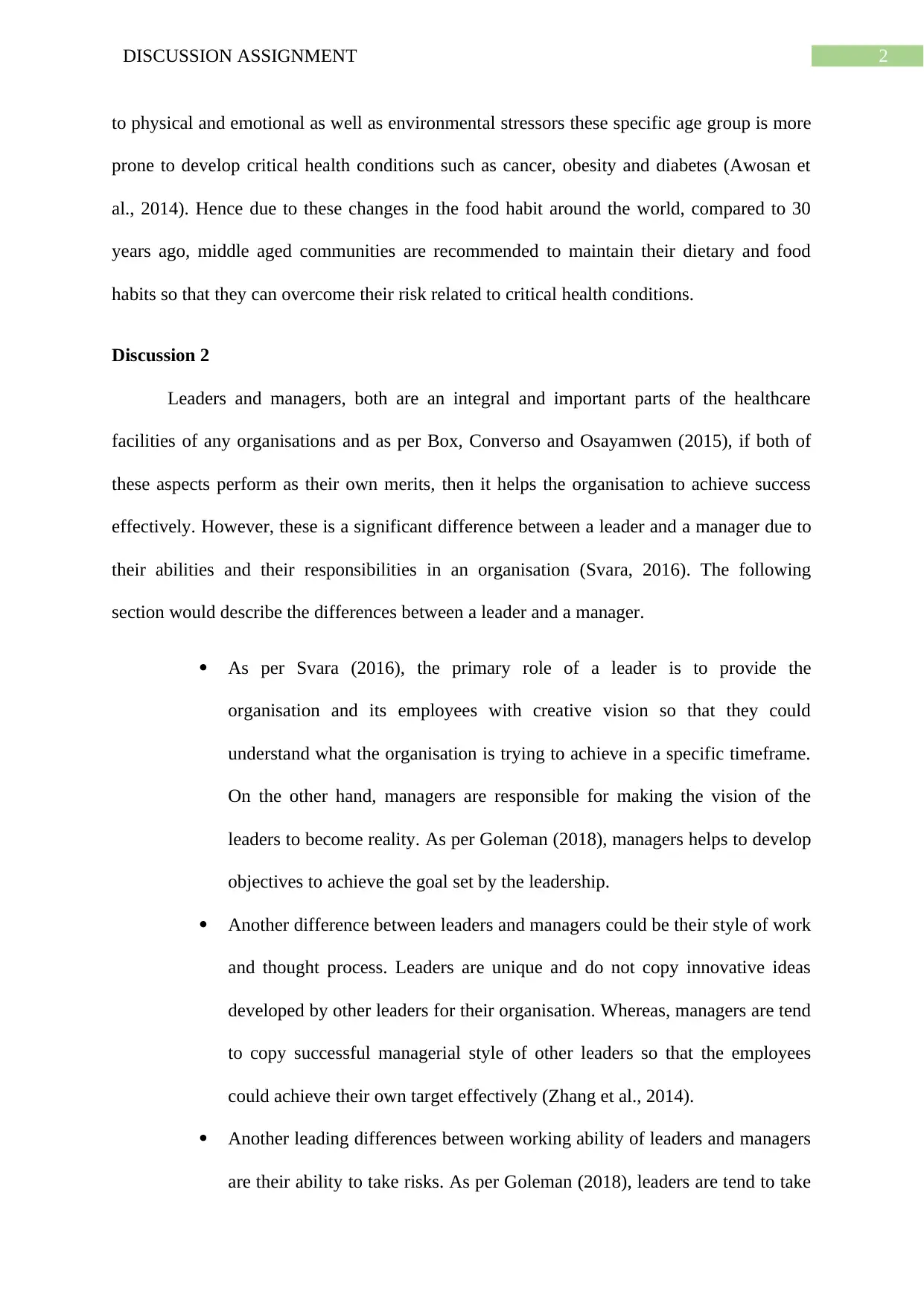
2DISCUSSION ASSIGNMENT
to physical and emotional as well as environmental stressors these specific age group is more
prone to develop critical health conditions such as cancer, obesity and diabetes (Awosan et
al., 2014). Hence due to these changes in the food habit around the world, compared to 30
years ago, middle aged communities are recommended to maintain their dietary and food
habits so that they can overcome their risk related to critical health conditions.
Discussion 2
Leaders and managers, both are an integral and important parts of the healthcare
facilities of any organisations and as per Box, Converso and Osayamwen (2015), if both of
these aspects perform as their own merits, then it helps the organisation to achieve success
effectively. However, these is a significant difference between a leader and a manager due to
their abilities and their responsibilities in an organisation (Svara, 2016). The following
section would describe the differences between a leader and a manager.
As per Svara (2016), the primary role of a leader is to provide the
organisation and its employees with creative vision so that they could
understand what the organisation is trying to achieve in a specific timeframe.
On the other hand, managers are responsible for making the vision of the
leaders to become reality. As per Goleman (2018), managers helps to develop
objectives to achieve the goal set by the leadership.
Another difference between leaders and managers could be their style of work
and thought process. Leaders are unique and do not copy innovative ideas
developed by other leaders for their organisation. Whereas, managers are tend
to copy successful managerial style of other leaders so that the employees
could achieve their own target effectively (Zhang et al., 2014).
Another leading differences between working ability of leaders and managers
are their ability to take risks. As per Goleman (2018), leaders are tend to take
to physical and emotional as well as environmental stressors these specific age group is more
prone to develop critical health conditions such as cancer, obesity and diabetes (Awosan et
al., 2014). Hence due to these changes in the food habit around the world, compared to 30
years ago, middle aged communities are recommended to maintain their dietary and food
habits so that they can overcome their risk related to critical health conditions.
Discussion 2
Leaders and managers, both are an integral and important parts of the healthcare
facilities of any organisations and as per Box, Converso and Osayamwen (2015), if both of
these aspects perform as their own merits, then it helps the organisation to achieve success
effectively. However, these is a significant difference between a leader and a manager due to
their abilities and their responsibilities in an organisation (Svara, 2016). The following
section would describe the differences between a leader and a manager.
As per Svara (2016), the primary role of a leader is to provide the
organisation and its employees with creative vision so that they could
understand what the organisation is trying to achieve in a specific timeframe.
On the other hand, managers are responsible for making the vision of the
leaders to become reality. As per Goleman (2018), managers helps to develop
objectives to achieve the goal set by the leadership.
Another difference between leaders and managers could be their style of work
and thought process. Leaders are unique and do not copy innovative ideas
developed by other leaders for their organisation. Whereas, managers are tend
to copy successful managerial style of other leaders so that the employees
could achieve their own target effectively (Zhang et al., 2014).
Another leading differences between working ability of leaders and managers
are their ability to take risks. As per Goleman (2018), leaders are tend to take
⊘ This is a preview!⊘
Do you want full access?
Subscribe today to unlock all pages.

Trusted by 1+ million students worldwide
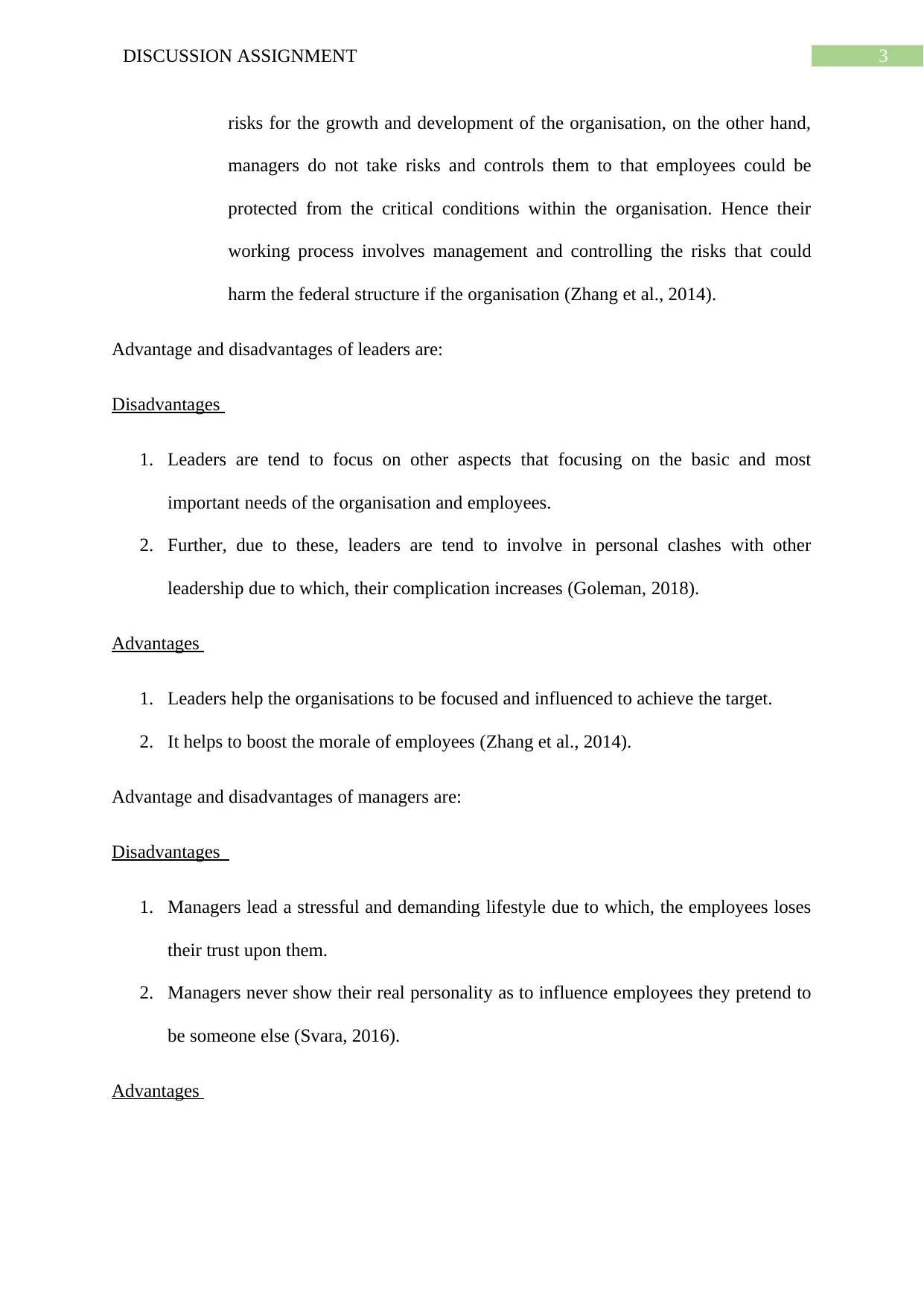
3DISCUSSION ASSIGNMENT
risks for the growth and development of the organisation, on the other hand,
managers do not take risks and controls them to that employees could be
protected from the critical conditions within the organisation. Hence their
working process involves management and controlling the risks that could
harm the federal structure if the organisation (Zhang et al., 2014).
Advantage and disadvantages of leaders are:
Disadvantages
1. Leaders are tend to focus on other aspects that focusing on the basic and most
important needs of the organisation and employees.
2. Further, due to these, leaders are tend to involve in personal clashes with other
leadership due to which, their complication increases (Goleman, 2018).
Advantages
1. Leaders help the organisations to be focused and influenced to achieve the target.
2. It helps to boost the morale of employees (Zhang et al., 2014).
Advantage and disadvantages of managers are:
Disadvantages
1. Managers lead a stressful and demanding lifestyle due to which, the employees loses
their trust upon them.
2. Managers never show their real personality as to influence employees they pretend to
be someone else (Svara, 2016).
Advantages
risks for the growth and development of the organisation, on the other hand,
managers do not take risks and controls them to that employees could be
protected from the critical conditions within the organisation. Hence their
working process involves management and controlling the risks that could
harm the federal structure if the organisation (Zhang et al., 2014).
Advantage and disadvantages of leaders are:
Disadvantages
1. Leaders are tend to focus on other aspects that focusing on the basic and most
important needs of the organisation and employees.
2. Further, due to these, leaders are tend to involve in personal clashes with other
leadership due to which, their complication increases (Goleman, 2018).
Advantages
1. Leaders help the organisations to be focused and influenced to achieve the target.
2. It helps to boost the morale of employees (Zhang et al., 2014).
Advantage and disadvantages of managers are:
Disadvantages
1. Managers lead a stressful and demanding lifestyle due to which, the employees loses
their trust upon them.
2. Managers never show their real personality as to influence employees they pretend to
be someone else (Svara, 2016).
Advantages
Paraphrase This Document
Need a fresh take? Get an instant paraphrase of this document with our AI Paraphraser
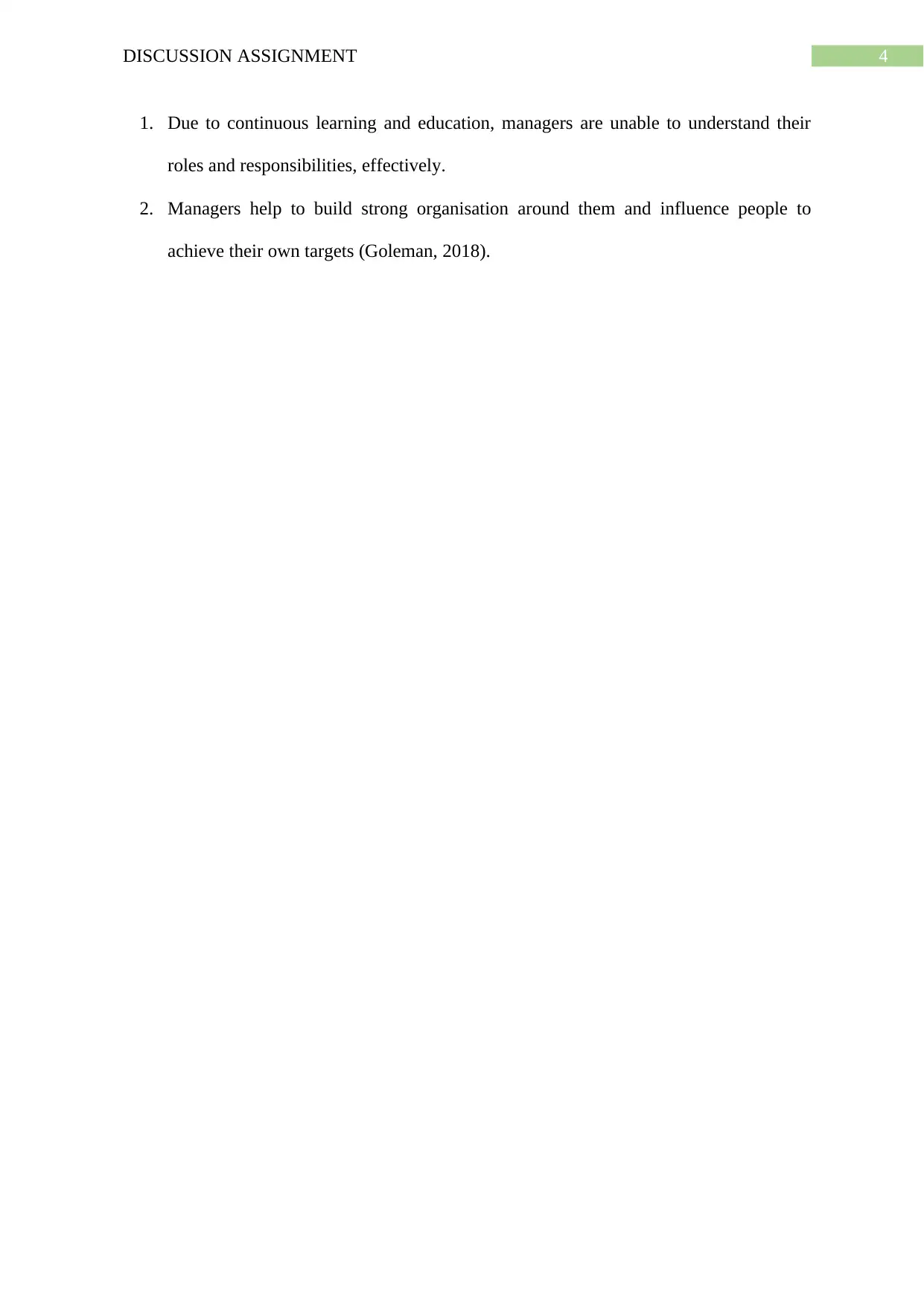
4DISCUSSION ASSIGNMENT
1. Due to continuous learning and education, managers are unable to understand their
roles and responsibilities, effectively.
2. Managers help to build strong organisation around them and influence people to
achieve their own targets (Goleman, 2018).
1. Due to continuous learning and education, managers are unable to understand their
roles and responsibilities, effectively.
2. Managers help to build strong organisation around them and influence people to
achieve their own targets (Goleman, 2018).
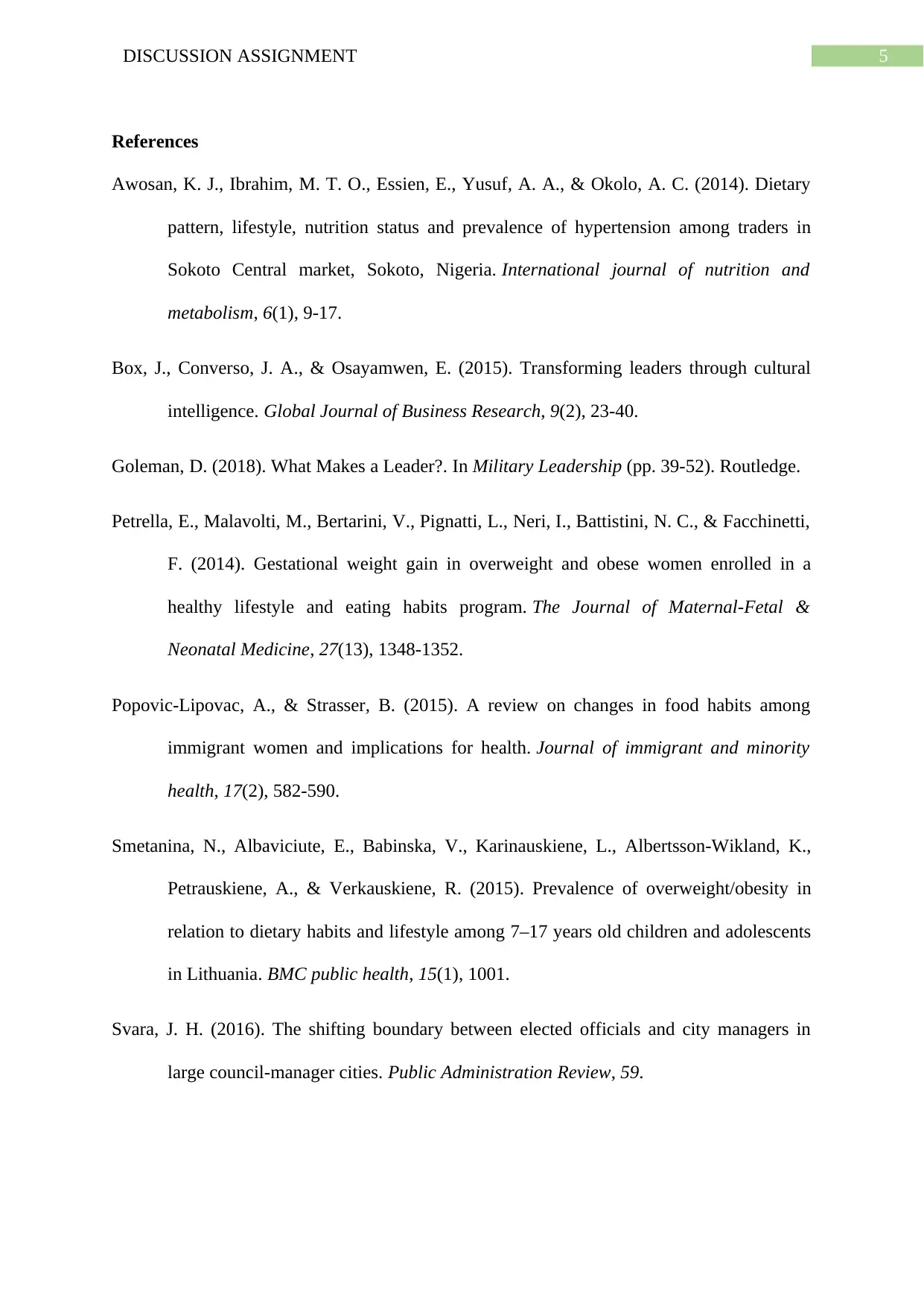
5DISCUSSION ASSIGNMENT
References
Awosan, K. J., Ibrahim, M. T. O., Essien, E., Yusuf, A. A., & Okolo, A. C. (2014). Dietary
pattern, lifestyle, nutrition status and prevalence of hypertension among traders in
Sokoto Central market, Sokoto, Nigeria. International journal of nutrition and
metabolism, 6(1), 9-17.
Box, J., Converso, J. A., & Osayamwen, E. (2015). Transforming leaders through cultural
intelligence. Global Journal of Business Research, 9(2), 23-40.
Goleman, D. (2018). What Makes a Leader?. In Military Leadership (pp. 39-52). Routledge.
Petrella, E., Malavolti, M., Bertarini, V., Pignatti, L., Neri, I., Battistini, N. C., & Facchinetti,
F. (2014). Gestational weight gain in overweight and obese women enrolled in a
healthy lifestyle and eating habits program. The Journal of Maternal-Fetal &
Neonatal Medicine, 27(13), 1348-1352.
Popovic-Lipovac, A., & Strasser, B. (2015). A review on changes in food habits among
immigrant women and implications for health. Journal of immigrant and minority
health, 17(2), 582-590.
Smetanina, N., Albaviciute, E., Babinska, V., Karinauskiene, L., Albertsson-Wikland, K.,
Petrauskiene, A., & Verkauskiene, R. (2015). Prevalence of overweight/obesity in
relation to dietary habits and lifestyle among 7–17 years old children and adolescents
in Lithuania. BMC public health, 15(1), 1001.
Svara, J. H. (2016). The shifting boundary between elected officials and city managers in
large council-manager cities. Public Administration Review, 59.
References
Awosan, K. J., Ibrahim, M. T. O., Essien, E., Yusuf, A. A., & Okolo, A. C. (2014). Dietary
pattern, lifestyle, nutrition status and prevalence of hypertension among traders in
Sokoto Central market, Sokoto, Nigeria. International journal of nutrition and
metabolism, 6(1), 9-17.
Box, J., Converso, J. A., & Osayamwen, E. (2015). Transforming leaders through cultural
intelligence. Global Journal of Business Research, 9(2), 23-40.
Goleman, D. (2018). What Makes a Leader?. In Military Leadership (pp. 39-52). Routledge.
Petrella, E., Malavolti, M., Bertarini, V., Pignatti, L., Neri, I., Battistini, N. C., & Facchinetti,
F. (2014). Gestational weight gain in overweight and obese women enrolled in a
healthy lifestyle and eating habits program. The Journal of Maternal-Fetal &
Neonatal Medicine, 27(13), 1348-1352.
Popovic-Lipovac, A., & Strasser, B. (2015). A review on changes in food habits among
immigrant women and implications for health. Journal of immigrant and minority
health, 17(2), 582-590.
Smetanina, N., Albaviciute, E., Babinska, V., Karinauskiene, L., Albertsson-Wikland, K.,
Petrauskiene, A., & Verkauskiene, R. (2015). Prevalence of overweight/obesity in
relation to dietary habits and lifestyle among 7–17 years old children and adolescents
in Lithuania. BMC public health, 15(1), 1001.
Svara, J. H. (2016). The shifting boundary between elected officials and city managers in
large council-manager cities. Public Administration Review, 59.
⊘ This is a preview!⊘
Do you want full access?
Subscribe today to unlock all pages.

Trusted by 1+ million students worldwide
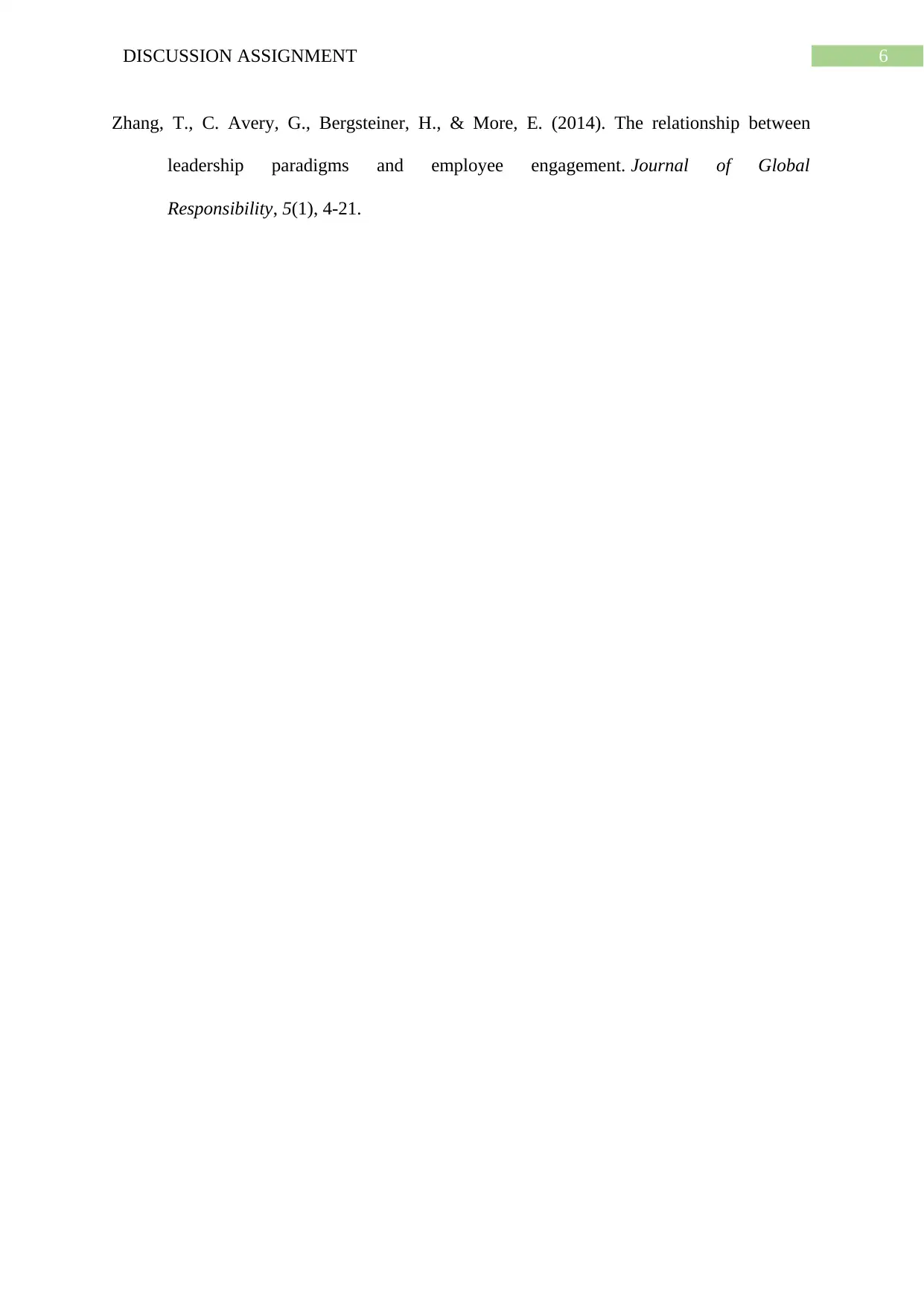
6DISCUSSION ASSIGNMENT
Zhang, T., C. Avery, G., Bergsteiner, H., & More, E. (2014). The relationship between
leadership paradigms and employee engagement. Journal of Global
Responsibility, 5(1), 4-21.
Zhang, T., C. Avery, G., Bergsteiner, H., & More, E. (2014). The relationship between
leadership paradigms and employee engagement. Journal of Global
Responsibility, 5(1), 4-21.
1 out of 7
Related Documents
Your All-in-One AI-Powered Toolkit for Academic Success.
+13062052269
info@desklib.com
Available 24*7 on WhatsApp / Email
![[object Object]](/_next/static/media/star-bottom.7253800d.svg)
Unlock your academic potential
Copyright © 2020–2026 A2Z Services. All Rights Reserved. Developed and managed by ZUCOL.





